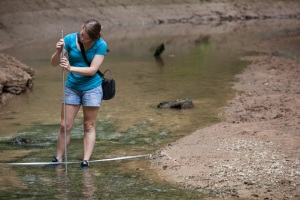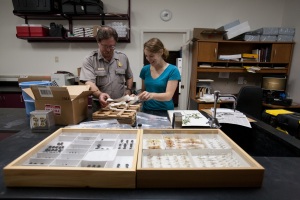Ogden News
WKU biology graduate completes internship at national park
- Thursday, June 20th, 2013
As a high school senior, Sara Wigginton knew she wanted to major in biology in college and pursue a career in ecology or conduct research in graduate school.

As part of an internship with the Cumberland Piedmont Network, WKU biology graduate Sara Wigginton assisted in monitoring the water quality of Echo River Springs and other cave-fed springs at Mammoth Cave National Park. (WKU photo by Clinton Lewis)
“I just really enjoyed all the sustainability and ecology sections that we worked on,” she said of her biology course at Bethlehem High School in Nelson County. “I knew that I wanted to be a biology major for a long time and I guess ecology was just the next logical step for me to take.”
After completing her degree in May at WKU and working for the past three years as intern in an ecological monitoring program based at Mammoth Cave National Park, Wigginton knows she made the right decision.
“The experience I have gained here is so valuable to my future because I think I want to do exactly this when I grow up,” said Wigginton, an Honors College graduate from Glendale. “It’s been a great experience to know that I am on the right path for what I want to do and that this is something I can do and want to keep doing for my whole life.”
Wigginton, the daughter of Mark and Juanita Wigginton, has worked with the Cumberland Piedmont Network, which monitors natural resources in 14 parks in eight states. WKU’s Center for Water Resource Studies coordinates the internships with Mammoth Cave National Park.
Working with scientists, researchers and resource managers over the past three years, Wigginton has assisted with conducting monthly water quality assessments of cave-fed springs along the Green River, traveled to other national parks in the Cumberland Piedmont Network to take part in vegetation monitoring, has gained experience trapping reptiles, bats, other small mammals and birds and has gained knowledge about natural resource monitoring by participating in projects such as Monitoring Avian Productivity and Survivorship, ozone and foliar injury monitoring, and cave cricket monitoring. She also has had the chance to interact with an endangered species, the Indiana bat, and has gained hands-on training in curatorial specimen processing, scientific data entry and many other areas of field biology.
“My resume is a lot stronger than some applicants who haven’t had the same field experience as I have,” she said. “I’ve worked on projects, vegetation monitoring, ozone monitoring, water quality monitoring. And I’ve also worked on a bunch of specimen and curatorial projects so I just have a little experience in a lot of things.”

WKU Sara Wigginton discussed a curatorial project with Brice Leech, natural resources specialist at Mammoth Cave National Park. (WKU photo by Clinton Lewis)
Brice Leech, natural resources specialist at Mammoth Cave National Park, said Wigginton has a bright future. “She was just a pleasure to work with,” he said.
Wigginton assisted Leech in monitoring the water quality of the park’s cave-fed springs that flow into the Green River. Most of those monthly monitoring trips were done by boat along a 30-mile stretch of the river.
“It’s really important because this is a really big water source in central Kentucky,” Wigginton said. “It’s really biodiverse and has some endangered species of mussels and cave shrimp living in it. So those are really important ecosystems to keep in check and make sure we’re not doing any damage.”
Wigginton completed her internship with a museum project of specimens collected in the park such as mammal skulls, butterflies, moths, beetles and vegetation. “My job is about 25 percent field work and 75 percent office work, which is totally worth it,” she said.
After completing the internship in mid-June, Wigginton plans to spend two months hiking a portion of the Appalachian Trail. Then she’ll begin applying to graduate schools in the western United States. Wigginton hopes one day to work for the Kentucky Department of Fish and Wildlife or the National Park Service, but “any sort of research job that has to do with ecology, I’ll be happy with,” she said.
Contact: Sara Wigginton, sarawigginton@gmail.com.

